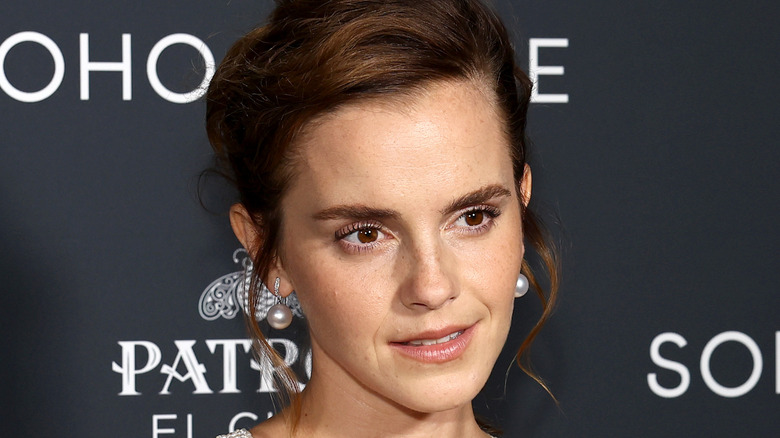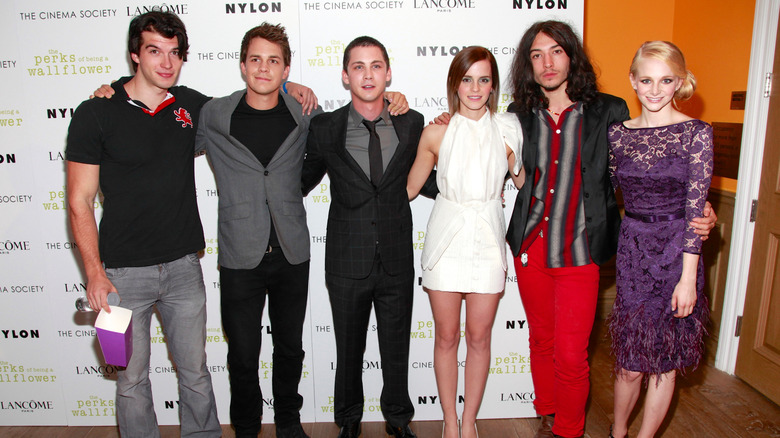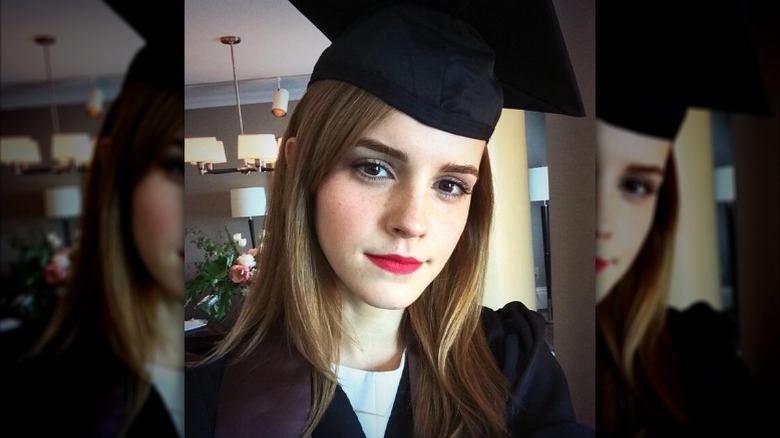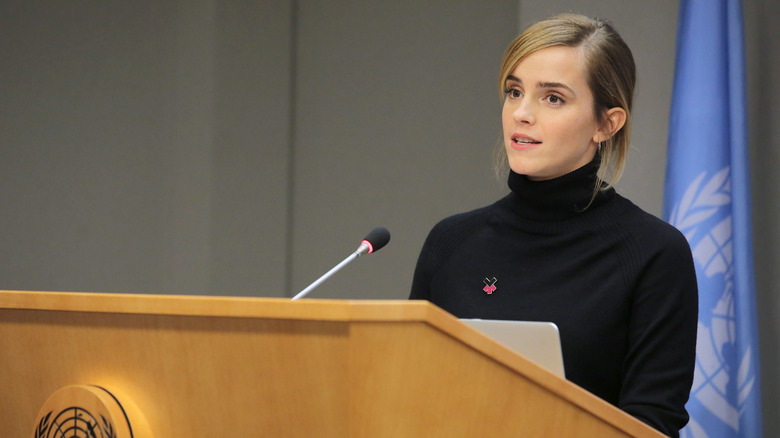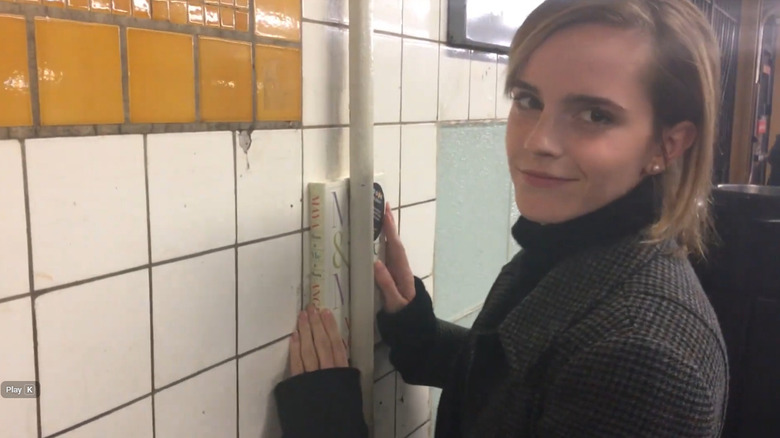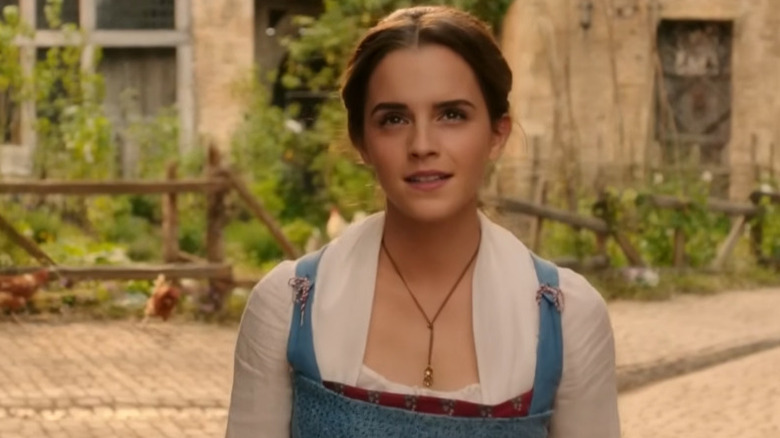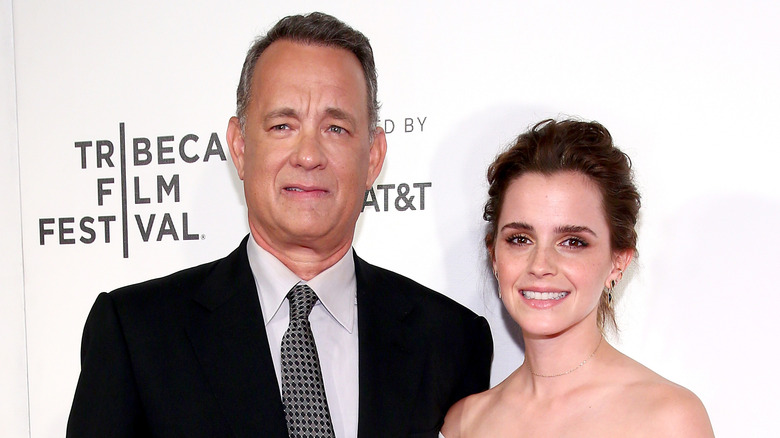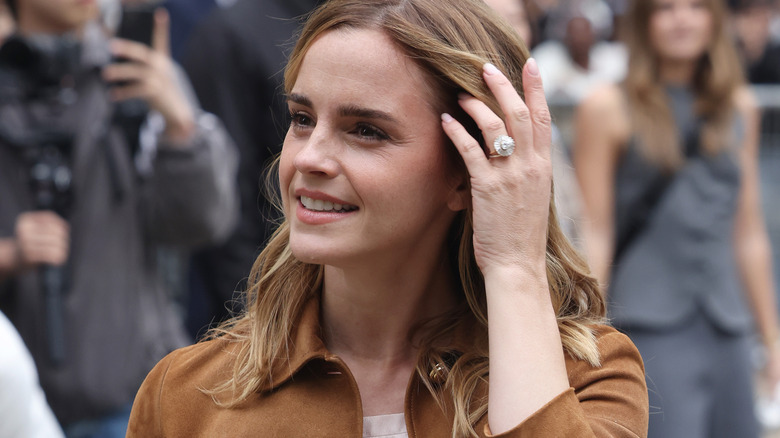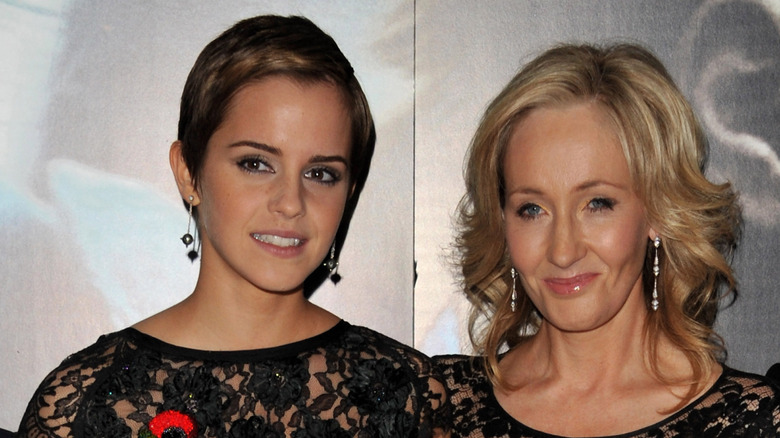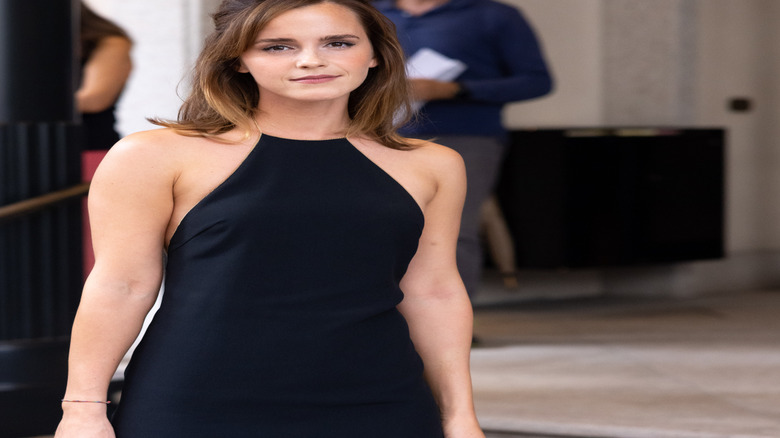Emma Watson Was Never The Same After Harry Potter
For a generation of people, Emma Watson has been omnipresent in the pop culture zeitgeist thanks to her iconic portrayal of Hermione Granger in the cinematic adaptation of J.K. Rowling's "Harry Potter" book series. Her lack of buck teeth notwithstanding, Watson may have been the perfect actress to bring Granger to the big screen. Rowling herself was on board with the casting from the start, despite having been more worried about that part than any other before production on the first film began, recalling in "The Women of Harry Potter" featurette, "I spoke to Emma on the phone. She was very young. I think she was 10. And I thought, 'You are going to be able to play a very bright, articulate girl with conviction because that's who you are.'"
After eight "Potter" films, memorable performances in films like "The Perks of Being a Wallflower" and the live-action remake of Disney's "Beauty and the Beast," an Ivy League education, her advocacy for women around the world, notable forays into high fashion, high-profile relationships, and two-plus decades of media coverage, Watson has shown herself to be much more than the "brightest witch of her age." The childhood she spent in the Wizarding World was simply the catalyst for her evolution as a performer and a force for good in the world. Here are some of the ways her life has changed since leaving Hermione behind.
Watson transitioned from franchise filmmaking and her Hermione box into more indie and auteur projects
In the modern cinematic landscape, franchise filmmaking rules the day, with superhero films and known intellectual properties driving box office performance, and Watson was involved with one of the biggest in the "Harry Potter" series, which has grossed more than $9.5 billion at the worldwide box office, according to The Numbers. Rather than gravitating toward the projects that would give her the best chance at getting the largest amount of eyeballs on her work after "Potter," though, Watson was more selective with the roles she accepted, leaning more into offbeat indie and auteur films.
Her first appearance after "Harry Potter and the Deathly Hallows: Part 2" was 2011's Simon Curtis-directed Marilyn Monroe biopic, "My Week With Marilyn," which saw her portray Lucy, a wardrobe assistant and secondary love interest for star Eddie Redmayne. Watson followed that up with Stephen Chbosky's "The Perks of Being a Wallflower" in 2012 and Sofia Coppola's "The Bling Ring" in 2013. All three films opened on a relatively small number of screens, and none grossed more than $36 million internationally. What they did do, though, was allow Watson to show another side of herself as a performer. So, too, did her wild cameo in Evan Goldberg and Seth Rogen's raunchy comedy, "This Is the End."
She pursued higher education at Brown and Oxford, altering her child star trajectory
For many who decide to make their living as performers — and actors in particular — career stagnation can be akin to career death, and a lifetime of success can be washed away in short order if it's followed by a streak of bad performances, bad PR, or an inability to continue landing jobs. This is especially true of child stars who peak at an early age and then struggle to evolve or transition into different creative spaces as adults. As such, it wasn't a totally obvious move when Watson decided to enroll at Brown University, a prestigious Ivy League institution, in 2009 while she was finishing up the "Harry Potter" series. Sure, she continued to act, but keeping her momentum going as a teen idol was far from her sole focus.
As a result, she walked with roughly 2,000 other students in the spring of 2014 with a bachelor's degree in English literature in tow, and she didn't stop there, either. More recently, Watson began pursuing a master's degree in creative writing at Oxford, although she reportedly has not completed her degree. Still, it's clear that Emma Watson is just like Hermione Granger when it comes to her education.
She became a UN goodwill ambassador and champion for gender equality
From an incredibly early age, Emma Watson was on the front lines of feminism, fighting for women of all ages in a very public way. Eventually, she took the cause to one of the most important intergovernmental agencies in the world — the United Nations. In 2014, the "Colonia" star was officially appointed a UN Women Goodwill Ambassador. To that end, she has served as an advocate for the organization's HeForShe campaign, which calls for men and people of all genders to stand shoulder to shoulder in support of women and the greater effort to foster gender equality.
During a speech announcing the campaign, Watson spoke of receiving different treatment than her male counterparts, of being sexualized as a young girl, and of seeing male friends unable to express their feelings, while expressing her own desire to be a force for change. "You might be thinking, 'Who is this 'Harry Potter' girl? And what is she doing up on stage at the UN?' It's a good question, and trust me, I have been asking myself the same thing. I don't know if I am qualified to be here. All I know is that I care about this problem. And I want to make it better."
She was recognized as the British Artist of the Year in 2014
The beginning of the 2010s felt like a culmination of sorts for Emma Watson after the Oxfordshire native spent the previous decade growing up as a person and an artist on the "Harry Potter" films. She also began pursuing higher education at an Ivy League school, emerged as a champion for gender equality, and then, in the years immediately following the final installment, continued to impress moviegoers and critics with her performances in "The Perks of Being a Wallflower," "This Is the End," and Darren Aronofsky's "Noah." For her efforts, she earned one of the most prestigious annual honors bestowed by the British Academy of Film and Television Arts, or BAFTA, in 2014, receiving the BAFTA Los Angeles Britannia Award for British Artist of the Year.
While receiving the award, Watson referred to her cohorts in the British film industry as a surrogate family and, in her inimitable style, cited an offbeat example of how the people who work in it had supported her. "A sweet but slightly morbid example of this is when, on the first 'Harry Potter' film, my on-set hamster, Millie, had a heart attack and didn't quite make it. So, the set decorators built a ... hamster coffin. And it had a velvet lining and a silver plaque on the front, which had Millie's name engraved on it," she revealed, via BBC America.
Watson started a feminist book club
Emma Watson's efforts to make the world a place where people of all genders get a fair shake are far more than just a part-time vanity project. Rather than simply showing up every once in a while to make a speech at the UN or drop a vaguely feminist soundbite on a talk show, she actively seeks opportunities to advance the cause and educate others on gender-related issues. Such was the case in 2016, when Watson posted a seemingly innocuous tweet, reading, "Hi team, I want to start a feminist book club but so far have only brainstormed 'Feminist Book Club' and 'Emma Watson Book Club.'" In the end, she settled on "Our Shared Shelf" and set about sharing feminist literature with thousands of other women online for several years.
However, the project didn't begin and end online; Watson also took it upon herself to purchase feminist books and leave them in random spots out in the world for others to discover, enjoy, and learn from. Free copies of Maya Angelou's "Mom & Me & Mom" were left in London and New York City.
She faced criticism for her Vanity Fair photo shoot
As a society that ferociously consumes information, pop culture, and entertainment on a near-constant basis via smartphones, social media, and the internet, we're often compelled to classify things and put them in tidy little boxes to help make sense of all the noise. Sometimes, though, reality doesn't align with our perception of it or the stereotypes assigned to what we see. For her part, Emma Watson encountered this dichotomy firsthand in 2017 after posing nearly topless during a photo shoot with famed fashion photographer Tim Walker for a Vanity Fair cover story. Despite her longtime advocacy for people of all genders over the years, Watson's provocative pictorial left some people questioning her feminist credentials.
Watson was taken aback by the criticism, opining that women should be able to express themselves in whatever manner they deem appropriate. "It just always reveals to me how many misconceptions and what a misunderstanding there is about what feminism is," she said in the wake of the incident (via The Guardian). "Feminism is about giving women choice. Feminism is not a stick with which to beat other women with. It's about freedom, it's about liberation, it's about equality. I really don't know what my t**s have to do with it. It's very confusing." Leave it to Watson to shut down any sexist comments pointed in her direction.
Her turn as Belle in the live-action remake of Beauty and the Beast had a mixed reception, but the film was a box office smash
After detouring into a series of more low-key projects in the years after her "Harry Potter" run came to an end, Emma Watson hopped back into the world of big-time studio productions and franchise filmmaking in a major way by signing on with Disney to play one of its iconic princesses, Belle, for the 2017 live-action remake of "Beauty and the Beast," opposite Dan Stevens as Beast. The Bill Condon-directed adaptation was a big hit, too, at least in the box office sense, grossing more than $1.2 billion worldwide against an estimated production budget of $160 million, according to Box Office Mojo.
The critical reception to the film didn't quite meet with the box office blitz, though, with some critics opining that Disney played it too safe by closely mimicking its 1991 animated retelling of the French fairy tale (while simultaneously failing to fully capture the whimsy of the original). "It looks the same, moves the same, and sounds the same (those Alan Menken songs!) as the original. But some of the magic has gone M.I.A.," wrote Rolling Stone's Peter Travers in a lukewarm review. Still, the film succeeded in introducing a new generation to the classic story, while Watson showed she could carry a blockbuster release all on her own as an actor.
The Circle flopped hard, but Little Women won hearts
In the same year that Emma Watson got back into the mode of playing iconic characters in big-budget productions, she also shared the screen with Hollywood legend Tom Hanks (who recently slammed one of his most famous roles) in James Ponsoldt's "The Circle," a cautionary tale about what could happen if tech companies, social media, and surveillance conspire to run amok. Prescient though the project may have been, it failed to resonate with audiences, grossing just under $41 million at the worldwide box office, per Box Office Mojo. Meanwhile, critics largely felt that it failed to deliver on its promise, with a RogerEbert.com review stating that the film "has a lot of good ideas and a few engrossing sequences, but it never quite finds a groove or even a mode, and it ends in an abrupt, unsatisfying way."
Watson got back into critics' good graces, though, with her performance as Meg March in the 2019 Greta Gerwig-directed adaptation of Louisa May Alcott's classic novel, "Little Women." The film was nominated for six Oscars, including Best Picture, and won the award for Best Costume Design. Meanwhile, the film grossed more than $220 million worldwide against a modest $40 million budget, according to Box Office Mojo.
She became a fashion icon and an important figure in the industry
Being in the public eye is tough; growing up in front of the camera and having the public watch and comment on your every waking move, appearance, and more (on a worldwide scale) from childhood is something else entirely, which is what Emma Watson has been forced to endure for most of her life. However, while some have crumbled under the pressure of being judged on that scale, Watson has soared, winning fans with good vibes and a world-class style sense. Where her fashion is concerned, Watson has had nary a bad moment, instead emerging as "Hollywood's Queen of Ethical Dressing," as appraised by Vogue, with fits that inspire while still being fully sustainable.
Watson's fashion icon status isn't solely about what she wears, though. She has also made waves as an industry exec, serving on the Board of Directors of the French fashion giant Kering — the owner of iconic brands like Gucci and Balenciaga. During her stint on Kering's board, Watson was also tapped as chair of the company's sustainability committee.
She caused a stir with a comment about 'self-partnering'
As with any celebrity, Emma Watson's love life has been the frequent subject of tabloid inquiry, social media discussion, and fan speculation. Consequently, her relationships, rumored flings, and romantic associations with the likes of businessman Leo Robinton, Brandon Green, and others have all garnered frequent mention and analysis in even mainstream media publications. Despite her past penchant for serial monogamy, Watson has more recently sought solace in her own company, revealing in a 2019 interview with British Vogue, "It took me a long time, but I'm very happy [being single]. I call it being self-partnered."
The comment gained significant traction, and the outlet revisited it with Watson in another interview four years later, during which she clarified that she wasn't necessarily celebrating being single. "Getting to the point when I was 30, I was realizing, 'Oh, maybe I've figured out some things about how to care for myself better — maybe quite well, actually,'" she said. Watson has continued to date and, in 2024, was spotted smooching an Oxford classmate, but she's currently playing coy where her official relationship status is concerned.
Watson has taken on Harry Potter creator JK Rowling on trans issues
Without J.K. Rowling and her "Harry Potter" books, one can only imagine where Emma Watson might be today. And looking beyond Watson's involvement in the cinematic adaptations and Rowling's frequent praising of the actress in the role of Hermione Granger, the two have also shared a special connection as champions for women over the years. More recently, though, the two have found themselves on the opposite end of the ideological spectrum, as Rowling has made statements that have been construed as anti-trans, getting herself canceled in the process.
In response, Watson shared her support for the marginalized group. "Trans people are who they say they are and deserve to live their lives without being constantly questioned or told they aren't who they say they are," Watson tweeted in 2020, joining a host of celebrities and other "Potter" stars in calling out Rowling. More recently, Watson seemingly extended an olive branch toward the Wizarding World creator, declaring that she still loves Rowling and refuses to "cancel her out" during a 2025 appearance on the Jay Shetty Podcast. However, Rowling's response was decidedly less rosy, writing in a lengthy X statement, "Emma has so little experience of real life she's ignorant of how ignorant she is."
She has stepped away from acting in recent years (and has a good reason for doing so)
Although Emma Watson remains very much in the public consciousness, it has actually been some time since audiences last saw her on the big screen. Outside of directing, narrating, and starring in a short film advertisement for Prada in 2022, Watson's last project was Greta Gerwig's 2019 adaptation of "Little Women." Since then, she has avoided the limelight, keeping busy with projects outside of the entertainment space and devoting more time to herself, her health, and her other passions in life. During a 2025 interview with Hollywood Authentic, she revealed that she had taken up pickleball, which she called "the best therapy I never paid for."
Watson also revealed the thing that may have pushed her into taking a sabbatical from acting, and it wasn't the acting itself. "I think I'll be honest and straightforward and say: I do not miss selling things. I found that to be quite soul-destroying," Watson revealed during the interview. "But I do very much miss using my skill set, and I very much miss the art. I just found I got to do so little of the bit that I actually enjoyed." It's no wonder she ultimately joined the ranks of actors to leave the limelight after their "Harry Potter" success.

